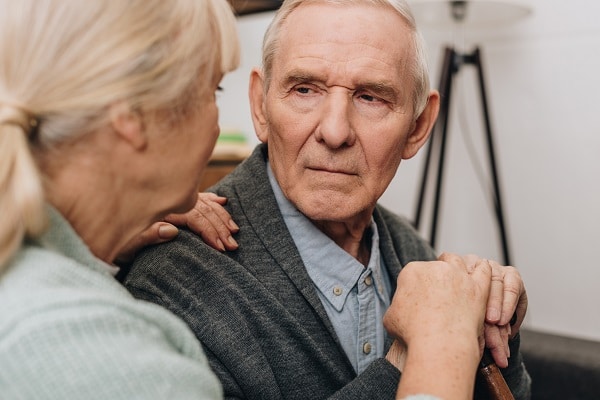Depression is one of the most common mental health conditions in the United States. It can affect anyone at any age, but it becomes more common as you age. According to a recent study, around 6 million American adults over 65 suffer from depression. If you are one of those people, you know how difficult it can be to manage depression while aging. This blog post will provide tips for managing depression and living a happy life to help make things easier!
Contents
Why Depression Affects Older Adults More

As unfortunate as it is, there are many reasons depression affects older adults more. First, as people age, they are more likely to experience loss and change, which can trigger depression. Loss can include the death of a loved one, retirement, or the loss of independence. In addition, older adults are more likely to have chronic health problems, which can lead to depression.
Finally, many older adults live alone or are isolated from family and friends, which can also contribute to depression. Treatment and other coping strategies make it possible to manage depression and live a happy life! If you are an older adult who experiences symptoms of depression, it is vital to seek professional help.
Depression is a severe condition that affects people in different ways. If you are an older adult struggling with depression, here are some tips that may help you manage your symptoms and live a happy life:
Admit Something Is Wrong

Depression is a common but serious problem among older adults. It’s often undiagnosed or undertreated, partly because older adults may be reluctant to admit that they’re feeling depressed. But acknowledging something wrong can be an essential first step in managing depression. Once you’ve recognized the problem, you can begin to take steps to address it.
Taking action to manage depression can lead to improved mood, increased energy levels, and greater overall well-being, which may involve seeking professional help, making lifestyle changes, or both. So, if you’re feeling depressed, don’t hesitate to seek help. It could make all the difference in your life.
Get Regular Physical Activity

Regular physical activity is essential for overall health and well-being, but it can also be extremely helpful in managing depression, especially in older adults. Research has shown that exercise can be as effective as medication in treating depression. It has the added benefits of being low-cost, not requiring a prescription, and having no negative side effects.
Furthermore, regular physical activity can help increase energy levels, improve sleep quality, reduce stress, and increase self-esteem. For older adults struggling with depression, regular exercise can be vital in managing the condition and maintaining their mental health.
Create A Daily Schedule And Stick To It

Depression is a common problem among older adults, but it doesn’t have to be a part of aging. Many things you can do to manage depression and keep it from taking over your life. One of the most effective methods is creating a daily schedule and sticking to it. When you have a set routine, it can help to ease anxiety and provide a sense of structure.
Even simple things like taking a walk at the same time each day or reading for 30 minutes before bed can make a big difference. Of course, it’s essential to be flexible and allow some spontaneity in your life. But having a basic schedule can provide a sense of stability that can be very helpful in managing depression, especially if you’re retired or don’t have a lot of social interaction during the day. Give it a try and see how it works for you!
Reach Out To Friends And Family

Depression can lead to feelings of isolation and loneliness, which can, in turn, make the condition worse. One way to combat this and help manage depression in older adults is by reaching out to friends and family members. Spending time with loved ones can help reduce feelings of isolation and loneliness and provide much-needed support and encouragement.
In addition, friends and family can offer practical assistance with activities of daily living, such as transportation or grocery shopping. By staying connected with loved ones, older adults can help improve their mood and use their support system to manage their depression.
Make Quality Sleep A Priority

One of the essential things that older adults can do to protect their mental health is to ensure they get quality sleep. Sleep plays a vital role in your physical and mental well-being, and research has shown a strong link between sleep and depression. Older adults who have trouble sleeping are more likely to experience symptoms of depression, and those who get enough quality sleep are more likely to stay mentally healthy.
If you are an older adult struggling with depression, making sleep a priority can be essential in managing your condition. By making sleep a priority, you can help reduce your symptoms of depression and improve your overall mental health. There are a few things you can do to help ensure you get the restful sleep you need, such as avoiding caffeine late in the day, establishing a regular bedtime routine, and creating a sleep environment that is dark, quiet, and cool.
Eat A Clean Diet

A healthy diet is vital for everyone, but it can be especially beneficial for older adults struggling with depression. Eating a diet rich in fruits, vegetables, and whole grains can help improve mood and energy levels, while processed and sugary foods can have the opposite effect. Additionally, getting enough vitamins and minerals is essential for maintaining mental health.
For example, deficiency in omega-3 fatty acids has been linked to an increased risk of depression, while getting enough vitamin D can help reduce symptoms. By eating a clean diet and ensuring that they get the nutrients they need, older adults can improve their depression symptoms.
Speak To A Therapist

Arguably the most effective treatment option is speaking to a therapist. Therapists can provide support and guidance as older adults work through their depression. They can also help older adults develop healthy coping mechanisms and teach them how to manage their symptoms.
Furthermore, therapists can provide information about other resources, such as support groups and medication. Speaking to a therapist for older adults struggling with depression can be an essential step in managing their condition.
Use These Tips To Help Manage Depression!
Depression is a severe condition that can be difficult to manage, but there are things that older adults can do to help. The tips listed above can all help manage depression. Remember, you are not alone in this! There are people and resources available to help you through this. If you or someone you know is struggling with depression, reach out for help. It can make all the difference. And as with any mental health disorder, encourage them to talk to their doctor if you notice a loved one is struggling. Early intervention is critical.


